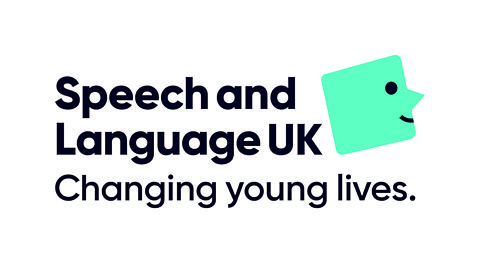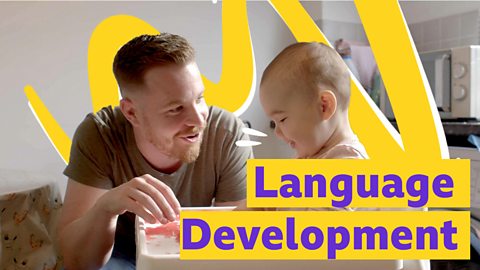If you could ask a Speech and Language Therapist anything about your childãs development, what would you ask?
We asked this question over on our Instagram page and received an overwhelming amount of responses, which we have answered below.
All of the answers were provided by Speech and Language Therapists Janet Cooper and Monal Gajjar.
Itãs completely natural to worry about your childãs language development and we hope the answers below help with your queries and ease your worries.

General Questions
Which letters do children often struggle to pronounce at first?
The easiest sounds for children to learn are the lips together sounds like 'p', 'b' and 'm.'
These might be followed by sounds made with your tongue at the front of the mouth like 'n', 's', 't' and 'd.'
Sounds that are further back in the mouth, 'k' and 'g', or need more complicated movements like 'ch', 'j' and 'sh', often come much later on.
Do you have any top tips for learning first words?
First, when youãre playing together or sharing books together, try not to ask questions. When we ask ãwhatãs that?ã, children can feel tested, so itãs more helpful just to point to and name things. Or even better, see what your child is most interested in and name that.
When youãre tuned in to the words your child most wants to say, then learn the Makaton signs for those things, and use them regularly. Makaton signs are also great to use when singing songs, which helps develop early communication skills.
Lastly, have fun playing with animal noises, transport noises, making sounds like ãmmmã, ãyuck!ã with pretend food. Lots of sound play helps develop early words in a fun way!
Does baby sign language delay speech?
All of the research actually suggests the opposite, that using baby sign language, or other signing systems, such as Makaton, actually helps children learn to talk.
The signs give children something visual, and physical, to link to the word. This helps them remember it more easily.
We often use gestures to help us remember the word weãre thinking of (when itãs on the tip of our tongue), and children do the same!
Always say the words when you do the signs with your child, and they will also do the same. Get signing!
What's the best way to respond when my child says words incorrectly?
Speaking clearly is really tricky for little ones as they are still practising listening, thinking about sounds and then moving their muscles to make the sound.
It is normal to make lots of mistakes particularly in the early years.
If they make a mistake - for example saying "poon" instead of "spoon" - be positive about their attempts but always model it back afterwards, so they can hear how it should sound. So you could say, "yes itãs a spoon".
Donãt ask them to repeat the word at this age or tell them they have said it wrong as this may put pressure on talking and put them off trying.
If your child is struggling to pronounce a specific sound, this article on pronunciation might offer you more information.
My child seems to have lost words? Should I be worried?
Children pick up words from the world around them and vary in the rate they will pick up words.
Some children may appear to stop using some of the words after a ãstressfulã life event - this might be anything from being ill, starting nursery, moving house or the appearance of a new baby in the family. Over time this language will reappear.
Children are often busy learning a range of skills so you may notice that while they are focussing on walking or potty training their speech development slows down for a while.
For some children, speech appears to continue to regress with no apparent reason. If this is the case it may indicate your child might need support and is worth discussing with your Health Visitor who will be able to advise you and refer on if necessary.
Is speech development linked to walking?
When children are first born their brain is not fully developed. Every experience helps make new brain connections that will shape the way they develop. They need lots of opportunities to practise and learn skills both for walking and talking.
If your child has started making progress in both at the same time, they have probably made these early brain connections through the opportunities you have provided. Carry on offering them experiences to keep this up.
Can it take longer for a second child to develop their speech?
This is very commonly experienced by parents who have a second child. Firstly, because they have an older child to compare the second child with, but also more commonly we often see the younger sibling getting fewer opportunities to use their communication skills.
We would suggest you set aside some time every day with your younger child, where they can have your undivided attention and donãt have to compete to speak.
During this time, follow their lead and comment on what theyãre doing. Play games where they can be in charge, for example when blowing bubbles, you are only allowed to blow the bubbles when they say ãgoã.
If they say words that are not clear, the best way to help is to repeat what they have said using the right words and sounds. There is no need to ask them to say it again.
Also, remember every child develops differently and this is ok.

Factors affecting language development
What impacts do dummies actually have on speech?
Using dummies occasionally in the first year is unlikely to cause any long term impact on speech, but if dummy use persists or if it is used a lot it can affect the way the sounds at the front of the mouth, like ãtã and ãdã, are made. Children will often swap these for back sounds like ãkã and ãgã.
Children who use dummies (and bottles) a lot after 12 months may also be more ãdribblyã, have more chance of getting ear infections which will affect speech and may have slushy speech - particularly the ãsã sound.
Best to use it only if it is really needed and aim to be gone by one.
Find out more about when babies should lose the dummy and how do I wean them off it.
Whatãs the impact of screen time on language?
Screen time has its place but it needs to be balanced with real-life opportunities and experiences.
Make sure your child is getting lots of active time and the chance to interact positively with real people face to face. There are lots of activities on this website that will keep them occupied if you need some inspiration!
Janet provides lots of advice on dealing with screen time in this article.
Should I be concerned about my toddlerãs dribbling?
Dribbling is usually linked to an open mouth posture and can be for a range of reasons.
It might be through regular use of dummies and bottles. If so try to remove them completely in the next few weeks. It may be due to mouth breathing through having a blocked nose, enlarged tonsils, cold or infection. If this is the case and it is persisting seek advice from your GP.
It may also be where the teeth donãt meet properly and this leaves a gap for the dribble to come out of. Your dentist will be able to advise on this.
In the meantime try to encourage them to gently wipe their chin if it gets wet to avoid soreness and encourage them to close their lips if theyãre holding their mouth open.

Anxiety-related speech & language concerns
Should I be worried about stammering?
Lots of children repeat sounds or hesitate over their speech while they are learning to talk and this can be part of a normal ãnon-fluentã phase.
Usually, this improves as they become better at talking and can think of the sentences they want to say. Keep calm, try not to bombard them with questions and slow your own rate of talking down a little to show you are listening and interested in what they are saying.
Keep an eye on how this develops and if it persists into school age you might want to seek advice from your local Speech and Language Therapy service.
Weãve got a whole guide on helping your child with their stammer right here.
How can we support a child with selective mutism?
Selective mutism is anxiety around talking. Very often children are capable of talking but go into a ãfight or flightã feeling when in a speaking environment outside their trusted circle. This can often lead to total silence and the more pressure you put on them to talk, the more anxiety builds up.
The main thing is to build trust and confidence and put no pressure on speaking. Do as much as you can to help them feel relaxed and give them opportunities to join in non-verbally (without needing to speak).
You might want to gradually introduce new people outside of the family circle into games and situations where there is no pressure on speaking.

Articulation questions
Are lisps anything to worry about?
In short ã no! We would generally only consider working on a lisp if the child is so aware of it that it affects their confidence, or if it causes their clarity of speech to be affected.
Did you know, the ãsã sound is one of the later sounds that children learn to use ã so how old they are when considering whether to try to correct a lisp is also a factor.
If you are still concerned, hereãs a quick tip to teach them how to make the ãsã sound: Sit in front of the mirror with your child and show them all the different parts of the mouth that we use to make sounds - lips, tongue, top teeth, bottom teeth, top of the mouth, back of the mouth.
Tell them: ãThere is a very special sound that likes you to smile when you say it. Keep the tip of your tongue behind your top teeth, smile and make the sound. Remember, to say this special sound we donãt want to see Mr tongue. He has to stay hidden behind our teethã.
Do tongue ties impact speech development?
Tongue ties present differently in each child. Not all children with tongue ties have speech difficulties.
Generally, if your child has had or is having difficulty with feeding due to their tongue-tie, then intervention to release the tie would be advised. Your health visitor or GP will be able to guide you with this.
In many cases, as children grow with their tongue ties, their mouths very easily adapt and they have no problem with speech sounds.
We do need to use the tip of our tongue to make certain speech sounds, like ãtã, ãdã, ãsã ãshã ãthã ãlã ã so if your child is not able to make these sounds, and you are sure they should be at the age they are, have a look to see if they are having difficulty raising their tongue tip to make these sounds.
You may also notice that they have difficulty chewing or eating certain types of food, find it hard to lick an ice cream and can be messy eaters. If this is the case, ask to be referred to an SLT so they can take a look and provide the right advice.
How can we support a child with apraxia or speech sound disorder?
There are lots of everyday tips to support children with speech difficulties.
Apraxia of speech is difficulty coordinating the movements for speech even though there is nothing wrong with the muscles.
Speech sound disorder covers a range of speech difficulties including difficulty discriminating sounds, difficulty storing the right sounds and choosing and blending the correct sounds for speech.
For either of these it is helpful to encourage lots of listening activities- listening to sounds around them, hearing rhymes, working out what sounds words begin and end with.
It is also great to have fun making sounds to practise all the movements you need in a fun way such as pulling funny faces in a mirror, copying tongue movements , blowing raspberries, sucking through a straw and blowing bubbles.
Some children benefit from having a visual clue when they are trying to find the correct sound so you may need to show them how the sound is made or use a hand signal such as ãcued articulationã to support their speech sound learning.

If you're worried about your child's speech and language progress, why not try the ? It's a quick questionnaire which helps you see how your baby or child is getting on with their speech, language and communication development.
Itãs not the same as a standardised measure a specialist would carry out but it should give you an idea of how your baby or child is developing and whether you need some support or advice to help you and them.
Alternatively, you can use their to get some professional advice from a speech and language therapist over the phone.
If you are following all of these bits of advice and your child is still not progressing, you may need a referral to a speech and language therapist.
Most speech and language therapy departments can be accessed via your local NHS service. You can often make the referral yourself, but it is always good to check first with your childãs health professional, GP or nursery practitioner.






